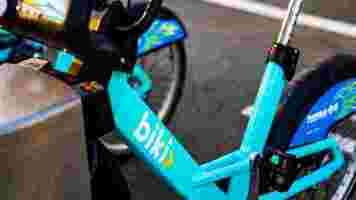Hawaii makes massive cuts to its bike-share scheme due to pandemic losses
This article was originally published by Christopher Carey on Cities Today , the leading news platform on urban mobility and innovation, reaching an international audience of city leaders. For the latest updates follow Cities Today on Twitter , Facebook , LinkedIn , Instagram , and YouTube , or sign up for Cities Today News.

Hawaii’s state capital Honolulu is cutting back services on its Biki bike-share scheme after sustaining huge financial losses during the pandemic.
In 2019, the program registered 1.4 million rides, but the pandemic has cut ridership figures in half.
Of the 130 docking stations currently in operation, 40-50 are now facing closure.
Bikeshare Hawaii Executive Director Todd Boulanger said that without financial help, the scheme is on the brink of going under within three to six months.
“We’re reaching out to the community for some help to bridge us over the next three to six months to develop some funding and we would also like to start discussing what is the plan for Biki now,” Boulanger told Hawaii News Now .
As an essential mobility service, Biki remained open at full capacity during the pandemic, but last month six stations were decommissioned and call center hours were reduced to cut costs.
The petition, “ SAVE BIKI : Ask Honolulu Leaders to Embrace Biki as Public Transit ” had 2,190 signatures as of today.
Blue Planet Communications Director Leigh Anne Mayberry said the goal is to get the service recognized as public transportation, so it could then be funded and included in the public transportation network.
The program is currently funded through multiple sources, including the City and County of Honolulu, the State of Hawaii, Ulupono Initiative, Hawaii Pacific Health, and individual donors.
Almost 50 percent of its revenue is currently sourced from sponsorship deals.
Do EVs excite your electrons? Do ebikes get your wheels spinning? Do self-driving cars get you all charged up?
Then you need the weekly SHIFT newsletter in your life. Click here to sign up .
Uber forced to leave Brussels — what happened to the company’s European dream?
Uber will be forced to halt all operations in Brussels from November 26, following a ruling issued by the city’s Court of Appeal on Wednesday, De Stanaard reports

While this blow to the ride-hailing giant’s business might come as a surprise to some, it has been brewing for over six years.
Uber entered Brussels in 2014 with UberPop, where private individuals could register to transport people for a fee. But a year later, local taxi company Taxis Vert filed a lawsuit against it and the court ruled that such a service didn’t comply with regulations.
Uber reformed its services in Brussels following the suit and has since only worked with drivers who have an VVB professional license — the same license held by limousine drivers.
But that doesn’t seem to have appeased courts, as they’ve now ruled that the 2015 cease-and-desist order also applies to the VVB drivers who work for Uber.
According to an official statement by the company, almost 2,000 drivers will loose “their opportunity to generate income.”
“De facto this concerns 95 percent of our drivers,” told an Uber spokesperson to De Standaard.
Following the news, many Uber drivers have taken to the streets in Brussels to protest the new ruling.
“More than 2,000 drivers have to support their families, pay their rent and the credit for their car, just like all other drivers. But apparently we are illegal,” said a driver to local news outlet Bruzz . “Technology is advancing, but we just keep going backwards. That is not normal. I have no words for it.”
Laurent Slits, the CEO of Uber in Belgium, was understandably not happy about the decision. He made his stance crystal clear in a statement, calling out Brussels’ backwardness:
This latest clash in Brussels is just the latest one in a long line of incidents. The company has fought a series of legal battles across Europe over how it employs its drivers, how it fits within regulations, and whether it unfairly competes with local taxi associations.
Let’s name a few examples:
In September, the Amsterdam civil court ruled that Uber drivers fall under the Dutch taxi drivers’ collective labor agreement — meaning they are entitled to the same employment benefits as taxi drivers.
Uber was forced to adjust its practices in Germany in 2019 in order to comply with national regulations and avoid a country-wide ban.
In 2017, the company was forced to briefly halt its services in Italy after a legal battle with the country’s taxi associations.
To put it simply, Uber’s growth in the European cities hasn’t been as easy as the company probably wished.
The EU isn’t really in favor of the gig economy model Uber represents, and besides that, Uber must take into account that operating in gray regulatory areas won’t actually bring profit in the long term.
Although it’s also fair for the company’s representatives to point out that legislative frameworks need to consider and adapt to current technological capabilities. But hopefully they don’t need to sacrifice people’s rights to do so.
Feast your eyes on Husqvarna’s stunning electric motorcycle concept
KTM-owned motorcycle marque Husqvarna , known for its street and motocross machines, is taking a stab at electric bikes at last. The 118-year-old Swedish company just unveiled its E-Pilen concept motorcycle, and it’s quite a looker.
Hit the play button above to get a glimpse of some of the details on the bike.
The sharp styling is reminiscent of the rest of Husqvarna’s line of street motorcycles, from the powerful 701 to the more tame 125 that launched recently. The classic round headlight paired with the futuristic wide tank, and the stubby rear end are the markings of a true Huskie.


Where it’s set to differ greatly, of course, is in the drive system. The electric E-Pilen is being designed to deliver 8 kW of power (roughly equivalent to a modest 10 HP), and a range of 100 km (62 miles), which means this will be mostly suitable for city commuting.
That’s also in line with Husqvarna’s aspirations to build in swappable batteries. Its owner, KTM, and other major bike makers including Yamaha, Piaggio, and Honda, agreed last month to band together as a consortium and define industry standards for batteries you could use across these brands’ vehicles.
With that, Husqvarna could soon attract a whole new kind of motorcycle enthusiast, looking to get their kicks in the city on a smallish bike to start — while avoiding emissions to boot.
The company hasn’t yet announced a launch date for the E-Pilen, but we’ll keep an eye on the news and report back when we learn more.